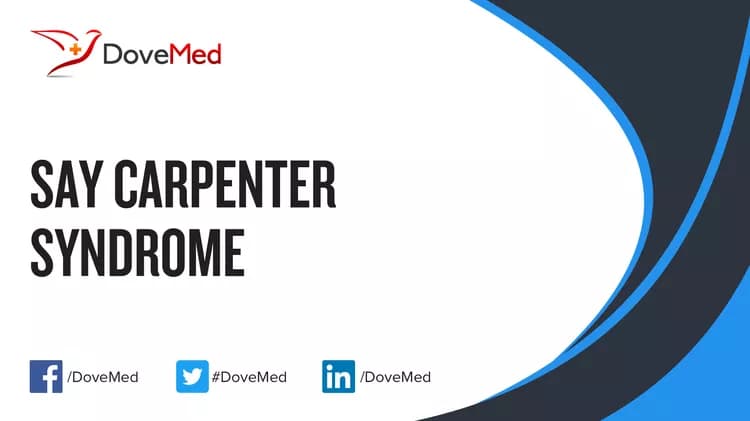What are the other Names for this Condition? (Also known as/Synonyms)
- Metaphyseal Dysplasia Hypertelorism Hypospadias
What is Say Carpenter Syndrome? (Definition/Background Information)
- Say Carpenter Syndrome is a rare congenital condition that is characterized by hypertelorism, nystagmus, impaired hearing, hypospadias and brittle long bones (metaphyseal dysplasia)
- Complex chromosomal translocations may lead to Say Carpenter Syndrome
Who gets Say Carpenter Syndrome? (Age and Sex Distribution)
- Say Carpenter Syndrome is a rare congenital disorder. The presentation of symptoms may occur at birth
- Both males and females may be affected
- Worldwide, individuals of all racial and ethnic groups may be affected
What are the Risk Factors for Say Carpenter Syndrome? (Predisposing Factors)
- A family history of Say Carpenter Syndrome may be a risk factor, since sporadic changes in chromosomal structure may be inherited
- Currently, no risk factors have been clearly identified for the syndrome
It is important to note that having a risk factor does not mean that one will get the condition. A risk factor increases one’s chances of getting a condition compared to an individual without the risk factors. Some risk factors are more important than others.
Also, not having a risk factor does not mean that an individual will not get the condition. It is always important to discuss the effect of risk factors with your healthcare provider.
What are the Causes of Say Carpenter Syndrome? (Etiology)
- Say Carpenter Syndrome may be caused by balanced translocation of genetic material between chromosomes 5, 8 and 10
- Chromosomal translocation can occur sporadically, resulting in a set of chromosomes that is different from the one an individual is born with
- If this re-arrangement does not result in a net gain or loss of genetic material, it is known as a “balanced translocation”
What are the Signs and Symptoms of Say Carpenter Syndrome?
The signs and symptoms of Say Carpenter Syndrome may include the following:
- Hypertelorism (widely-spaced eyes)
- Nystagmus (involuntary and repetitive movement of eyes)
- Hearing impairment
- Hypospadias or opening of the penis on the underside in males
- Metaphyseal dysplasia, in which the outer areas of the bone shaft in long bones are weakened, causing brittle bones
How is Say Carpenter Syndrome Diagnosed?
Say Carpenter Syndrome is diagnosed on the basis of the following information:
- Complete physical examination
- Thorough medical history evaluation
- Assessment of signs and symptoms
- Laboratory tests
- Imaging studies
- Biopsy studies, if necessary
Many clinical conditions may have similar signs and symptoms. Your healthcare provider may perform additional tests to rule out other clinical conditions to arrive at a definitive diagnosis.
What are the possible Complications of Say Carpenter Syndrome?
The complications of Say Carpenter Syndrome may include:
- Repeated bone fractures
- Hearing loss
- Problems with urination
Complications may occur with or without treatment, and in some cases, due to treatment also.
How is Say Carpenter Syndrome Treated?
There is no cure for Say Carpenter Syndrome, since it is a genetic condition. The treatment is usually given to manage the signs and symptoms and any complication that develops.
How can Say Carpenter Syndrome be Prevented?
Say Carpenter Syndrome may not be preventable, since it is a genetic disorder.
- If there is a family history of the condition, then genetic counseling will help assess risks, before planning for a child
- Active research is currently being performed to explore the possibilities for treatment and prevention of inherited and acquired genetic disorders
- Regular medical screening at periodic intervals with tests and physical examinations are recommended
What is the Prognosis of Say Carpenter Syndrome? (Outcomes/Resolutions)
- The prognosis of Say Carpenter Syndrome is dependent upon the severity of the signs and symptoms and associated complications, if any
- Individuals with mild conditions have better prognosis than those with severe symptoms and complications
- Typically, the prognosis may be assessed on a case-by-case basis
Additional and Relevant Useful Information for Say Carpenter Syndrome:
The following DoveMed website link is a useful resource for additional information:
Related Articles
Test Your Knowledge
Asked by users
Related Centers
Related Specialties
Related Physicians
Related Procedures
Related Resources
Join DoveHubs
and connect with fellow professionals


0 Comments
Please log in to post a comment.